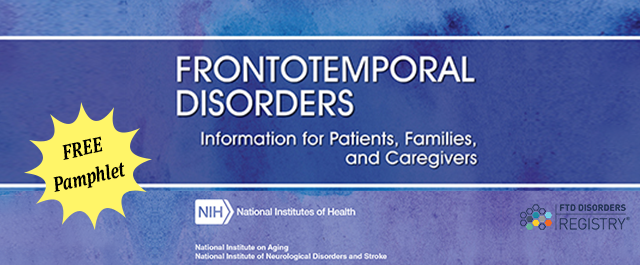PRESS & NEWS
NIH Booklet Offers Insight to FTD, Its Symptoms, Diagnosis, Treatment, Care

The National Institutes of Health (NIH) offers a free pamphlet about frontotemporal degeneration (FTD) that is meant to help diagnosed persons, family members, and caregivers learn more about these conditions. Frontotemporal Disorders: Information for Patients, Families, and Caregivers also offers resources for coping with these disorders. The 32-page publication provides detailed information about the three major types…
The National Institutes of Health (NIH) offers a free pamphlet about frontotemporal degeneration (FTD) that is meant to help diagnosed persons, family members, and caregivers learn more about these conditions. Frontotemporal Disorders: Information for Patients, Families, and Caregivers also offers resources for coping with these disorders.
The 32-page publication provides detailed information about the three major types of frontotemporal disorders: progressive behavior/personality decline (such as Pick's disease), progressive language decline (including primary progressive aphasia), and progressive motor decline. It explains what is known about the different types of disorders, common symptoms, causes and how they are diagnosed. Most importantly, it describes how to manage these difficult conditions, with practical advice for both persons diagnosed and their caregivers.
Chapters include:
- The Basics of Frontotemporal Disorders
- Types of Frontotemporal Disorders
- Causes of FTD
- Diagnosis
- Common Symptoms
- Treatment and Management
- Caring for a Person with a Frontotemporal Disorder
- Resources
This free booklet is available as an online download or can be mailed to you.
The National Institute of Neurological Disorders and Stroke (NINDS) and the National Institute on Aging (NIA) are part of the National Institutes of Health (NIH), the nation’s medical research agency — supporting scientific studies that turn discovery into health.
NIA leads the federal government effort conducting and supporting research on aging and the health and well-being of older people. NIA’s Alzheimer’s and related Dementias Education and Referral (ADEAR) Center offers information and publications on dementia and caregiving for families, caregivers, and professionals.
NINDS is the nation’s leading funder of research on the brain and nervous system. The NINDS mission is to reduce the burden of neurological disease.
For more information, contact:
- National Institute on Aging Alzheimer’s and related Dementias Education and Referral Center at https://www.nia.nih.gov/ or call 1-800-438-4380
- National Institute of Neurological Disorders and Stroke at www.ninds.nih.gov or call 1-800-352-9424
Together we can find a cure for ftd
The FTD Disorders Registry is a powerful tool in the movement to create therapies and find a cure. Together we can help change the course of the disease and put an end to FTD.
Your privacy is important! We promise to protect it. We will not share your contact information.



